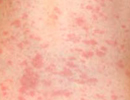
26850 Providence Parkway Suite #300, Novi, MI, 48374
Phone: 248.348.4200
Fax: 248.380.6457

Gavini Pediatric & ADHD Clinics26850 Providence Parkway, Suite 300, Novi, MI 48374 :: 248.348.4200www.ADHDclinic.com :: www.YourKidsDoctor.com |
|
|---|---|
RoseolaWhat is RoseolaRoseola is considered to be a very common mild infection that affects most children by the age of two. There are two strains of the human herpes virus that can cause Roseola, Human Herpesvirus 6 and less commonly, Human Herpesvirus 7. Roseola is not typically considered to be a serious infection , however individuals who have compromised immune systems may experience possible serious complications from Roseola.Average age of infants contracting Roseola is 6 -18 months. Immunocompromised individuals may have a harder time fighting off Roseola and can develop the serious condition of encephalitis (inflammation of the brain). |
|
|
Roseola rash Signs and SymptomsThe symptoms of Roseola may include:
Seizures are possible with the sudden onset and rise of the fever. Often, by the time the fever has presented, the threat of seizure has passed. |
|
Rash
|
|
Treatment
|
|
